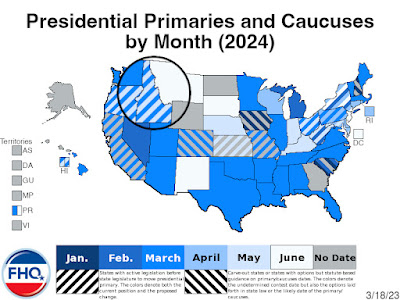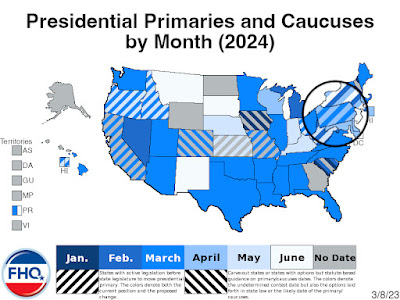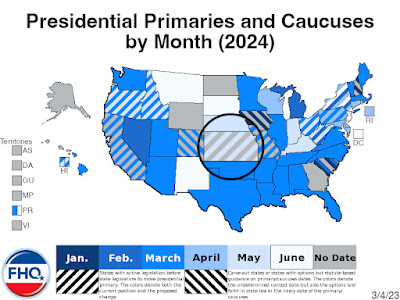But then came Thursday’s House State Affairs Committee consideration of the measure. The hearing itself covered familiar ground. Sponsors (and the secretary of state) touted the more than $2 million savings consolidating the elections would have while those tightly associated with the state Republican Party cried foul for not being consulted about the potential change ahead of time (before its winter meeting earlier this year).
And it was during that Republican Party backlash to the legislation that the hearing got interesting. Idaho Republican Party Chair Dorothy Moon spoke in opposition to the bill, saying that, if anything, the state party would prefer to move the primary up even further on the calendar than the second Tuesday in March rather than back to May. She went on to say that she and the party would like to have been given the chance to work with the Republican National Committee to move the primary to February; to make Idaho the “Iowa of the West.”
Put a pin in that for a second. That is a storyline in and of itself, but there was another twist.
All the witnesses who lined up to testify spoke, and it then looked as if the committee was going to move quickly to vote on S 1186 and presumably push it to the floor. Again, the three floor votes that each of these two bills had faced ended with bipartisan passage. The assumption, then, was that State Affairs was going to move this to the House floor for final consideration. Instead, this happened:
State Affairs Committee Chair Brent Crane (R-13th, Nampa): “Senate bill 1186 is properly before the committee."
Silence. [Crane glances around with a slight, knowing grin on his face.]
Chair Crane: “Senate bill 1186 dies for lack of a motion.”
From the Democratic side of the dais: “Uh.”
Chair Crane: “Already made my decision.”
So, with that S 1186 died in committee.
Now, that could mean a lot of things moving forward. But what it means in the near term is that Governor Little has a decision to make about H 138. If he signs the measure into law, then the March presidential primary is eliminated, but has no home alongside the May primary. If, however, he vetos the House bill, then everything with the presidential primary stays the same as it has been in Idaho for the last two cycles.
Maintaining the status quo on the March primary may hinge on how much the governor values the cost savings of eliminating the stand-alone presidential primary. If he prioritizes that roughly $2 million savings, then Little may very well sign the bill or allow it to become law without his signature.
But that means there would be no Idaho presidential primary in 2024, at least not without further action in a special legislative session. It could be that consideration in that setting may occur after enough time that the state Republican Party has had a chance to consult with the RNC about their February primary idea. Granted, that proposal would be dead on arrival with the national party. The RNC set the early calendar in the rules it adopted in April 2022, and Idaho was not among the states given a carve-out to hold February or earlier primaries or caucuses. Additionally, Idaho Republicans would face the national party’s stiff super penalty if it opted to thumb its nose at the rules and conduct a February contest.
That may or may not be enough to deter the Idaho state legislature from going along with an unsanctioned (by the RNC), state-funded presidential primary in February or even raising the presidential primary issue again in a special session. But the Idaho Republican Party may forge ahead without the primary, whether a state-funded option is available or not.
Gem state Republicans may choose to hold caucuses instead. And, like West Virginia, Idaho fits into this sort of sweet spot with respect to the RNC super penalty. Yes, the penalty would eliminate all but 12 delegates if Idaho broke the timing rules. But there are only 30 Idaho delegates to begin with. Yes, that is a penalty and one that is greater than the old 50 percent reduction that the RNC employed in the 2012 cycle. Yet, it may not be enough to keep Idaho Republicans from forcing the issue and attempting to become the “Iowa of the West.”
And honestly, that may be a good thing for the overall Republican primary calendar for 2024. The Democratic calendar — with South Carolina at the top on February 3 — is likely to push the early Republican states into January, leaving a barren expanse with no contests for all or much of February until Super Tuesday on March 5. A February Idaho caucus and/or a Michigan primary (with waiver) may help fill in that gap.
However, all of that remains to play out. First thing’s first: Governor Little has a decision to make on H 138. And it is a bigger decision than one might expect for a seemingly simple presidential primary bill.









